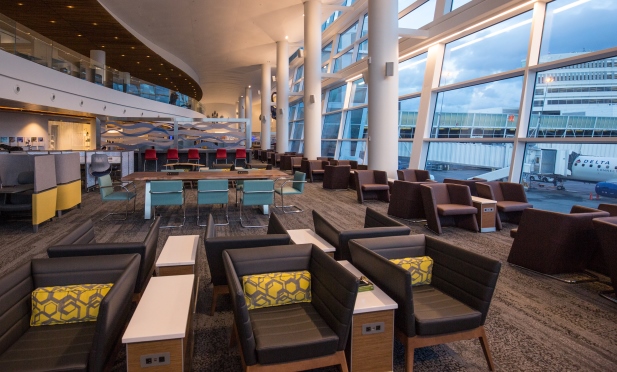 Smart windows were installed at the Delta Sky Club in the Sea-Tac Airport.
Smart windows were installed at the Delta Sky Club in the Sea-Tac Airport.
SEATTLE—More than 7,500 square feet of View smart windows were installed at the Delta Sky Club in the Seattle-Tacoma International Airport a couple of years ago. At 21,000 square feet, the club is the second Delta Sky Club at Sea-Tac and ranks among the five largest Delta Sky Clubs. With these windows, club members and guests can enjoy unobstructed views of Mount Rainier.
A related study was performed on the impact of in-terminal passenger experience and its correlation to higher revenues and reduced operational expenses. The survey, undertaken by Alan Hedge of
Cornell University was conducted in tandem with a pilot study conducted by DFW and View Inc. along with an independent aviation market research group.
“The study found that terminal windows fitted with View Dynamic Glass overwhelmingly improved passenger comfort over conventional glass, resulting in an 83% increase in passenger dwell time at a preferred gate seat and a 102% increase in concession spending,” Brandon Tinianov, vice president of strategy at View and a member of the US Green Building Council board of directors, tells GlobeSt.com.
Unlike traditional glass, this type of glass tints automatically in response to outdoor conditions or manually via a mobile device, providing greater comfort and energy savings without compromising the view. Even with moderate outdoor temperatures, infrared imaging showed that dynamic glass reduced surface temperatures by 10 to 15 degrees on seats, carpets, passenger clothing and skin compared to the gate with conventional glass. This improvement promotes greater passenger comfort and enables reduced use of HVAC systems for cooling.
This translates to longer dwell times and increased spending. Survey results found that passengers seated near dynamic glass stayed 83% longer than passengers seated next to conventional glass. After dynamic glass was installed in the bar area of a DFW Airport restaurant, there was a 102% increase in alcohol sales compared to the previous six months.
Commercial buildings in particular have installed intelligent glass for health and wellness, as an office perk, energy savings, weather variations and view enhancement.
Recent studies have shown how smart windows improve health and wellness among workers, reduce computer vision syndrome by 51%, headaches by 63%, drowsiness by 56% and even increases worker productivity by 2%.
Another recent study conducted by HR advisory and research firm, Future Workplace, looked at the overall employee experience and what workers value most in the workplace. The most-valued office perk was not the free food, nap pods or pet-friendly environment, but having a view to the outside.
Smart windows also improve the overall energy efficiency of a building by 20%. US cities deal with excessive heat waves, cloud coverage and weather changes but this technology intuitively responds to outside conditions. It keeps unwanted solar radiation and glare out, and natural sunlight in. It can also predict when clouds are coming and going, and adjust accordingly.
View currently has more than 400 completed installations across 30 million square feet of real estate, with an additional 250 committed projects.
© Touchpoint Markets, All Rights Reserved. Request academic re-use from www.copyright.com. All other uses, submit a request to [email protected]. For more inforrmation visit Asset & Logo Licensing.







